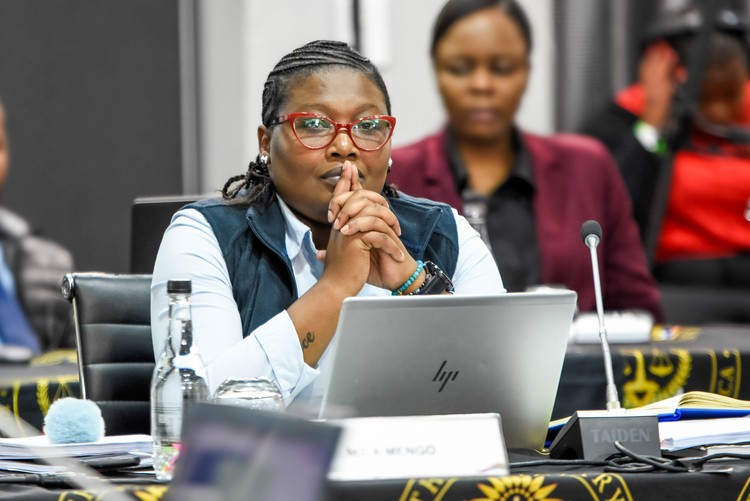Complainant “flirted” with Judge President Mbenenge, tribunal told
Forensic linguist cross-examined by Mbenenge’s lawyer
Andiswa Mengo, who is accusing Eastern Cape Judge President Selby Mbenenge of sexual harassment, at the Judicial Conduct Tribunal on Wednesday. Photo: Office of the Chief Justice
- The advocate representing Eastern Cape Judge President Selby Mbenenge told the Judicial Conduct Tribunal on Wednesday that junior court clerk Andiswa Mengo had flirted with Mbenenge.
- Mengo has accused Mbenenge of sexual harassment.
- Forensic linguist Dr Zakeera Docrat was cross-examined by Mbenenge’s advocate.
- Docrat conceded that some of the messages from Mengo could be seen as flirtatious, but disagreed that Mengo had not rebuffed the sexual overtures.
The junior court clerk accusing Eastern Cape Judge President Selby Mbenenge of sexual harassment “flirted” with him in “deeply sexual WhatsApp conversations”, Mbenenge’s advocate told the Judicial Conduct Tribunal on Wednesday.
The complainant, Andiswa Mengo, contends that the attention she received from Mbenenge was unwanted.
Advocate Griffiths Madonsela on Wednesday cross-examined forensic and legal linguist Dr Zakeera Docrat.
Docrat, who said she is one of only 10 forensic linguists in South Africa, testified on Tuesday that the conversations between Mbenenge and Mengo would start off politely but then would “degenerate” into sexual conversations, with Mbenenge sending Mengo emojis such a peeled banana, an eggplant and a peach, which Docrat said represented the penis and the vagina.
She said Mengo’s responses with repeated “rolling on the floor laughing” emojis, and monkeys with hands covering their faces were, in the context, a sign that she was either laughing, “laughing it off” or shy and embarrassed.
During cross-examination on Wednesday, she conceded that some of the responses could be seen as being flirtatious.
Docrat agreed with Madonsela that the emojis sent by Mengo conveyed that she was “laughing things off”, that she was embarrassed but that she was “in agreement with the sexual conversations”.
But she disagreed with his submission that Mengo did not at any point rebuff his sexual overtures. “I cannot give a blanket response to that…there was an instance where she wrote to him ‘no honourable member, don’t do that’.”
She also confirmed that her analysis of the WhatsApp messages was done without regard to Mengo’s testimony or Mbenenge’s affidavit.
Madonsela pointed out instances where Docrat’s interpretation of messages was different from Mengo’s. One example was when Mengo was booked off sick and Mbenenge said he would come and give her “a boost”, with an emoji of a syringe.
Docrat had said, in the context of the conversation, this did not represent a medical device, but rather a penis. But Mengo had said she took it to mean that he wanted her to heal. Docrat agreed that Mengo’s interpretation must trump hers.
Madonsela also introduced into evidence a “unicode”, reflecting all the available emojis, with names and descriptions. It would be submitted by their own expert that this contained standardised meanings, Madonsela said.
In terms of that code, a syringe was a medical device associated with “doctor, flu, medicine and vaccination”, he said.
But Docrat said that in the WhatsApp messages between Mengo and Mbenenge, emojis had not been used in the standard manner, as in the unicode. However, under re-examination by evidence leader Advocate Salome Scheepers, she agreed that the emoji of the monkey covering its eyes was, in the unicode, also linked to the word “no”.
Questioned by Advocate Nasreen Rajab-Budlender, representing Mengo on behalf of the Women’s Legal Centre, Docrat agreed that Mbenenge had a “good understanding” of what he intended the emojis to mean “especially in the context of the eggplant, peach and banana emojis. It was not used in a context of discussing fruit and vegetables but in a sexual connotation”.
She said Mengo had never used these types of emojis.
Questioned by the tribunal chair, retired Judge Bernard Ngoepe, she said Mbenenge’s expert, Dr Vincent Mello, was not one of the ten forensic linguists in the country. She had been told that he was an expert in information and communication technology.
In her view, he was not qualified to interpret emojis in the context of text messages.
Questioned by Madonsela, Docrat said she could not dispute that he was an expert in coding and the standardisation of the meaning of emojis.
The tribunal is expected to sit until May 16.
Support independent journalism
Donate using Payfast

Don't miss out on the latest news
We respect your privacy, and promise we won't spam you.
© 2025 GroundUp. This article is licensed under a Creative Commons Attribution-NoDerivatives 4.0 International License.
You may republish this article, so long as you credit the authors and GroundUp, and do not change the text. Please include a link back to the original article.
We put an invisible pixel in the article so that we can count traffic to republishers. All analytics tools are solely on our servers. We do not give our logs to any third party. Logs are deleted after two weeks. We do not use any IP address identifying information except to count regional traffic. We are solely interested in counting hits, not tracking users. If you republish, please do not delete the invisible pixel.

